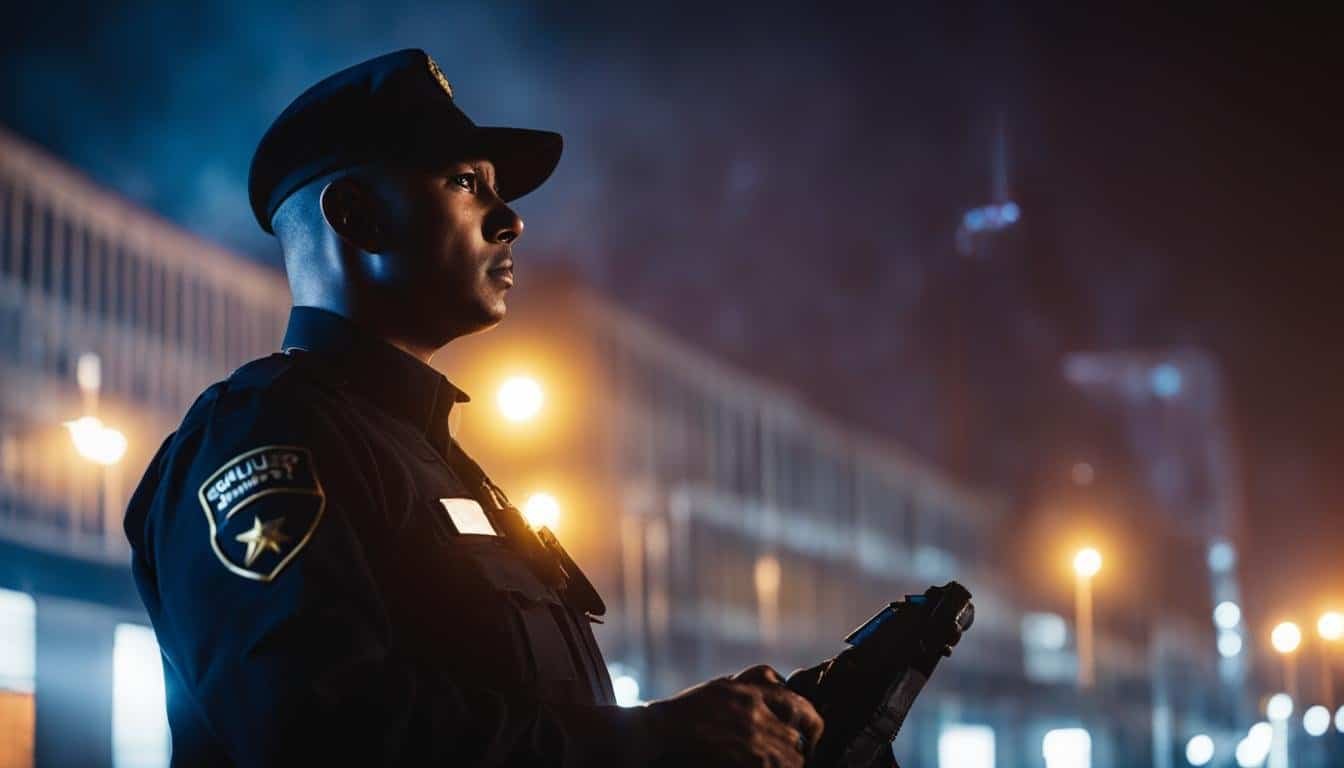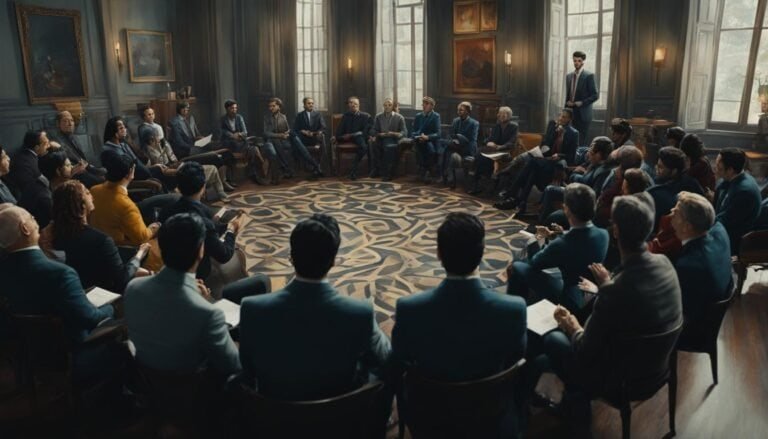Skills as a Security Officer
When it comes to excelling as a security officer, having the right skills is paramount. Security officers are responsible for maintaining the safety and protection of individuals, properties, and assets. To fulfill this role effectively, there are several essential skills that security officers must possess.
First and foremost, strong written and verbal communication skills are crucial for security officers. Clear and effective communication is essential when interacting with colleagues, the general public, and other stakeholders. Security officers must be able to convey instructions, explain security procedures, and communicate necessary information clearly and assertively.
Additionally, security officers need to have excellent interpersonal skills. Building rapport and maintaining positive relationships with individuals from diverse backgrounds is essential in this profession. Understanding and empathizing with others can help de-escalate conflicts, resolve issues, and foster a sense of trust and cooperation.
Another vital skill for security officers is their knowledge of security operations and procedures. This includes understanding the basics of security and fire inspection procedures, as well as adhering to safety protocols. Security officers should also be adept at following complex instructions and guidelines to ensure smooth operations.
Furthermore, security officers need to have a keen attention to detail and strong observation skills. Being able to recognize suspicious behavior, identify potential threats, and maintain situational awareness is critical for preventing security incidents. By paying close attention to facial expressions, environmental cues, and other indicators, security officers can take proactive measures to mitigate risks.
Lastly, security officers must possess strong critical thinking and problem-solving abilities. They need to be able to assess risks, make quick decisions, and respond appropriately in emergency situations. Having the ability to analyze security gaps and vulnerabilities allows security officers to address potential concerns and implement effective preventive measures.
Key Takeaways:
- Effective communication skills, both written and verbal, are crucial for security officers to convey instructions and information clearly.
- Interpersonal skills help security officers build rapport and resolve conflicts with individuals from diverse backgrounds.
- Knowledge of security operations and procedures is important for ensuring smooth operations and adhering to safety protocols.
- Observation skills and situational awareness enable security officers to recognize suspicious behavior and identify potential threats.
- Critical thinking skills allow security officers to assess risks, make sound decisions, and respond effectively in emergencies.
Effective Communication
Clear and assertive communication is fundamental in the field of security. Security officers must possess strong communication skills in order to effectively interact with individuals from diverse backgrounds, including visitors, employees, and stakeholders. Whether conveying instructions, explaining security procedures, or relaying important information, the ability to communicate clearly is crucial.
Verbal communication is a key aspect of effective communication for security officers. It involves articulating information in a concise and understandable manner. Security officers must be able to convey messages confidently and assertively, ensuring that their instructions are followed accurately. Additionally, active listening is vital for fully understanding the needs and concerns of others, allowing security officers to respond appropriately and provide effective support.
Written communication skills are also important for security officers, as they often need to document incidents, write reports, and communicate through written channels such as email or memos. Being able to express ideas clearly and concisely in writing is essential for maintaining accurate records and sharing important information with relevant parties.
Interpersonal skills play a significant role in effective communication as well. Security officers must be able to establish rapport, build trust, and navigate various interactions with people from different backgrounds. Interpersonal skills such as empathy, adaptability, and conflict resolution are crucial for resolving conflicts, managing challenging situations, and fostering positive relationships.
“Effective communication is the foundation of successful security operations. It enables security officers to effectively convey instructions, explain procedures, and address concerns. Strong verbal and written communication skills, along with interpersonal skills, are essential for maintaining a safe and secure environment.”
Continuous training in communication skills is vital for security officers to enhance their ability to effectively communicate. These training programs can include role-playing exercises, scenario-based simulations, and workshops focused on improving communication techniques. By honing their communication skills, security officers can ensure that information is effectively transmitted and received, enabling them to fulfill their responsibilities and contribute to a safe and secure environment.
Benefits of Effective Communication for Security Officers:
- Clear and concise conveyance of instructions and information
- Ability to de-escalate conflicts and defuse tense situations
- Accurate and comprehensive documentation of incidents and reports
- Better understanding of the needs and concerns of individuals
- Enhanced interpersonal relationships and collaboration with colleagues and stakeholders
| Verbal Communication Skills | Written Communication Skills | Interpersonal Skills |
|---|---|---|
| Clear and assertive articulation | Effective writing and documentation | Empathy and rapport building |
| Active listening | Concise expression of ideas | Conflict resolution and adaptability |
| Confidence in conveying instructions | Accurate reporting and record-keeping | Effective collaboration and teamwork |
Observation and Awareness
The ability to observe and maintain situational awareness is crucial for security officers. By developing strong observation skills, security officers can effectively recognize and respond to potential threats, ensuring the safety of people and assets. Attention to detail is a key component of observation, allowing officers to notice subtle indicators of suspicious behavior.
When on duty, security officers should pay close attention to facial expressions, body language, and environmental cues. These cues can provide valuable insights into the intentions and actions of individuals in their surroundings. By remaining vigilant and aware of their surroundings, security officers can detect potential threats early on, taking preventive measures to mitigate risks.
Recognizing suspicious behavior is another important aspect of observation and awareness. Security officers should be trained to identify signs of unusual activity or behavior that may indicate a potential threat. This can include individuals loitering in restricted areas, attempting unauthorized access, or acting in a secretive or suspicious manner.
“Observation is a skill that can be honed through regular practice and training,” says John Smith, a security expert with over 20 years of experience. “By conducting regular drills and scenario-based training exercises, security officers can enhance their observation skills and become more effective in their roles.”
Furthermore, maintaining situational awareness enables security officers to coordinate effectively with other team members or emergency responders. By actively observing their environment and staying attuned to changes, officers can provide accurate and timely information to assist in the resolution of security incidents or emergencies.
To illustrate the importance of observation and awareness, consider the following scenario:
A security officer stationed in a busy shopping mall notices a person acting nervously and frequently adjusting their backpack. The officer’s sharp observation skills and situational awareness raise concerns, prompting them to inform the mall management and discreetly monitor the individual’s activities.
Later investigations reveal that the individual was indeed planning a potential terrorist attack. Thanks to the security officer’s attention to detail and quick thinking, a disaster was averted, ensuring the safety of countless people within the mall.
Regular training exercises, including simulated scenarios, can help security officers enhance their observation skills and decision-making in high-pressure situations. By continuously refining their observation and awareness abilities, security officers can better protect the environments they serve.
Key Takeaways:
- Observation and situational awareness are essential skills for security officers.
- Attention to detail enables officers to notice subtle indicators of suspicious behavior.
- Recognizing suspicious behavior involves identifying unusual activity or actions that may indicate a potential threat.
- Regular training and practice enhance observation skills and decision-making abilities.
- Effective observation allows for better coordination with team members and emergency responders.
Critical Thinking Skills for Security Officers
Security officers often find themselves in challenging situations that require quick thinking and problem-solving abilities. Developing strong critical thinking skills is crucial for assessing risks, making sound decisions, and responding appropriately in emergencies. It also enables security officers to analyze security gaps and vulnerabilities within their environment, ensuring effective security measures.
Enhancing Critical Thinking Abilities
To enhance critical thinking skills, security officers can engage in various activities and exercises:
- Mental exercises: Practicing puzzles, riddles, and brain teasers can help sharpen analytical thinking and decision-making skills.
- Case study analysis: Studying real-life security incidents and analyzing the actions taken can provide valuable insights for future problem-solving scenarios.
- Role-playing scenarios: Participating in simulated security situations allows officers to apply critical thinking skills in a controlled environment, preparing them for real-life emergencies.
The Benefits of Critical Thinking
Developing critical thinking skills provides security officers with several advantages:
- Effective problem-solving: Critical thinking allows officers to assess complex situations, identify potential risks, and proactively address them.
- Thorough risk assessment: Security officers with strong critical thinking abilities can evaluate risks and make informed decisions to mitigate them effectively.
- Adaptability: Critical thinking skills enable security officers to quickly adapt to changing circumstances and adjust their responses accordingly.
“Critical thinking is an essential skill for security officers, as it empowers them to analyze situations objectively, make informed decisions, and respond effectively in the face of uncertainty.”
By continuously honing their critical thinking skills, security officers become more equipped to handle the complexities of their role, ensuring the safety and security of people and assets in various environments.
Conflict Resolution
Conflict resolution skills are crucial for security officers as they often encounter challenging and potentially volatile situations. The ability to effectively resolve conflicts allows security officers to de-escalate stressful scenarios, preventing further escalation and restoring order when necessary. Through active listening, understanding perspectives, and facilitating open dialogue, security officers can successfully navigate conflicts and maintain a safe environment.
Training programs focused on conflict resolution and realistic scenario-based exercises play a vital role in developing and improving conflict resolution skills. These programs provide security officers with the necessary tools and techniques to defuse tense situations, foster effective communication, and ultimately achieve peaceful resolutions.
“Conflict resolution is not about winning or losing; it’s about finding a solution that satisfies all parties involved.”
By honing their problem-solving abilities and enhancing communication skills, security officers can effectively navigate conflicts and achieve optimal outcomes. The application of de-escalation techniques, coupled with strong problem-solving and communication skills, empowers security officers to diffuse tension and maintain a safe and secure environment.
The Benefits of Conflict Resolution Skills
- Promote a peaceful and harmonious environment
- Reduce the likelihood of violence and escalation
- Foster positive relationships with colleagues and stakeholders
- Enhance overall team collaboration and productivity
- Build trust and confidence within the community
Through effective conflict resolution, security officers can positively impact their workplace and contribute to a safer society.
Conflict Resolution Techniques
Here are some effective conflict resolution techniques that security officers can employ:
- Active Listening: By actively listening to all parties involved, security officers gain a comprehensive understanding of the issue at hand and demonstrate empathy.
- Mediation: Acting as a neutral third party, security officers can facilitate a peaceful dialogue between conflicting parties, helping them reach a mutually beneficial resolution.
- Problem-Solving: Applying critical thinking and problem-solving skills, security officers can identify the root causes of conflicts and work towards finding practical solutions.
- Emotional Control: Maintaining emotional control allows security officers to remain calm and composed in tense situations, diffusing anger and preventing further escalation.
| Conflict Resolution Skills | De-Escalation Techniques | Problem-Solving | Effective Communication |
|---|---|---|---|
| Active listening | Remaining calm and composed | Critical thinking | Empathy and understanding |
| Mediation | Using non-confrontational language | Identifying root causes | Clear and assertive communication |
| Collaboration | Respecting personal boundaries | Seeking creative solutions | Active listening skills |
Developing and honing conflict resolution skills is an ongoing process. Regular training and continuous education in conflict resolution techniques help security officers remain prepared and proficient in handling conflicts effectively.
Conclusion
In conclusion, excelling as a security officer requires a combination of various skills. The top skills for a security officer include effective communication, observation and awareness, critical thinking, and conflict resolution. These skills are essential for ensuring the safety and protection of people and assets.
Continuous training, drills, and engagement in professional development opportunities are crucial for security officers to enhance their skills and stay up-to-date with the evolving security landscape. By mastering these skills, security officers can excel in their roles and contribute to a safer environment.
Remember, as a security officer, your skills and abilities are vital in maintaining safety and order. Stay vigilant, continue learning, and strive to always improve your skills as a security officer.






